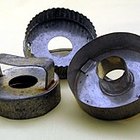bhofack2/iStock/GettyImages
Fresh-baked homemade biscuits are welcome at any meal -- a light and fluffy accompaniment to soak up a sauce or just provide a pleasant contrast in textures and flavors. Whipping up a batch doesn't take long, but it can be that one job too many when you're already pressed for time. It's easier to make some up ahead of time as opportunity permits, and either freeze them for later use or put the dough in your refrigerator overnight.
Biscuit Basics
American-style biscuits have much in common with England's much-loved scones, their direct ancestor, and in practice there's enough similarity between recipes that it's hard to differentiate them any more. A good biscuit is light and fluffy, and contains enough butter or other fat to be soft and moist,. Rolled varieties separate readily into flaky layers after they're baked. Biscuit doughs can be made with either baking soda or baking powder for their leavening, but that choice has a direct impact on whether the dough can be refrigerated.
Baking Soda Biscuits
Baking soda arrived on the market in the 19th century, replacing older leavening agents such as hartshorn and sourdough in biscuit-making. Baking soda, or sodium bicarbonate, is a white powder that's distinctly alkaline. When it's moistened and exposed to acidity, the soda reacts chemically to produce bubbles of carbon dioxide gas. This is trapped by the dough, causing the biscuits to puff and rise. The problem, for time-strapped bakers, is that this reaction begins as soon as the dough is mixed. Soda biscuits retain much of their lift if they're immediately frozen, but will lose much of their leavening power if they're permitted to sit overnight in the refrigerator.
Baking Powder Biscuits
If bakers didn't balance the baking soda with acidic ingredients such as buttermilk, the finished biscuits often had an unpleasantly soapy, chemical flavor from the leftover soda. Manufacturers addressed that by creating baking powder, which matched the soda with premeasured quantities of dry acidic ingredients such as cream of tartar. Modern double-acting baking powders combine two acids, one of which only reacts in the heat of the oven. Biscuit dough made with baking powder loses some of its leavening in the refrigerator overnight, but the heat-activated portion of the powder is still adequate to bake light, fluffy biscuits.
Using Your Dough
You can refrigerate the dough either as a single ball or already cut into biscuits, whichever is more practical. Rolled biscuits will be lighter if you roll and cut them before refrigeration, rather than chilling the dough in a ball. If you leave the rolling and cutting for the next day, you'll be squeezing out part of the carbon dioxide that's already formed inside the dough. It's also counterproductive from the pragmatic perspective, because doing your work ahead of time is the whole point. If you usually make drop biscuits rather than rolled biscuits, there's no reason to portion them until you're ready to bake.
Related Articles

Do You Have to Bake Your Biscuit Dough ...
Why Are My Biscuits Always Flat?
Can You Refrigerate Homemade Yeast ...

The History of the Biscuit Cutter

What if You Forget & Let Bread Dough ...

What Works With Baking Soda Besides ...

Can Self Rising Flour Substitute for ...

Can You Use Cream of Tartar to Make ...

What Temperature to Cook Scones?

What Is Docking Used for in Baking?

Can You Make Croissants With Baking ...

Can I Freeze Unbaked Biscuits?

How to Make Scones

Can I Make Monkey Bread the Night ...

What Can You Substitute for Baking ...

How to Make Homemade Biscuits With Water

How to Know if Banana Bread Is Spoiled
How to Make Homemade Bread

What Happens When I Put in Too Much ...

Can I Rebake a Souffle?
References
- On Food and Cooking: The Science and Lore of the Kitchen; Harold McGee
- The Professional Pastry Chef; Bo Friberg
- Clabber Girl: FAQs
- Joy of Baking: Baking Powder and Baking Soda
Writer Bio
Fred Decker is a trained chef and prolific freelance writer. In previous careers, he sold insurance and mutual funds, and was a longtime retailer. He was educated at Memorial University of Newfoundland and the Northern Alberta Institute of Technology. His articles have appeared on numerous home and garden sites including GoneOutdoors, TheNest and eHow.